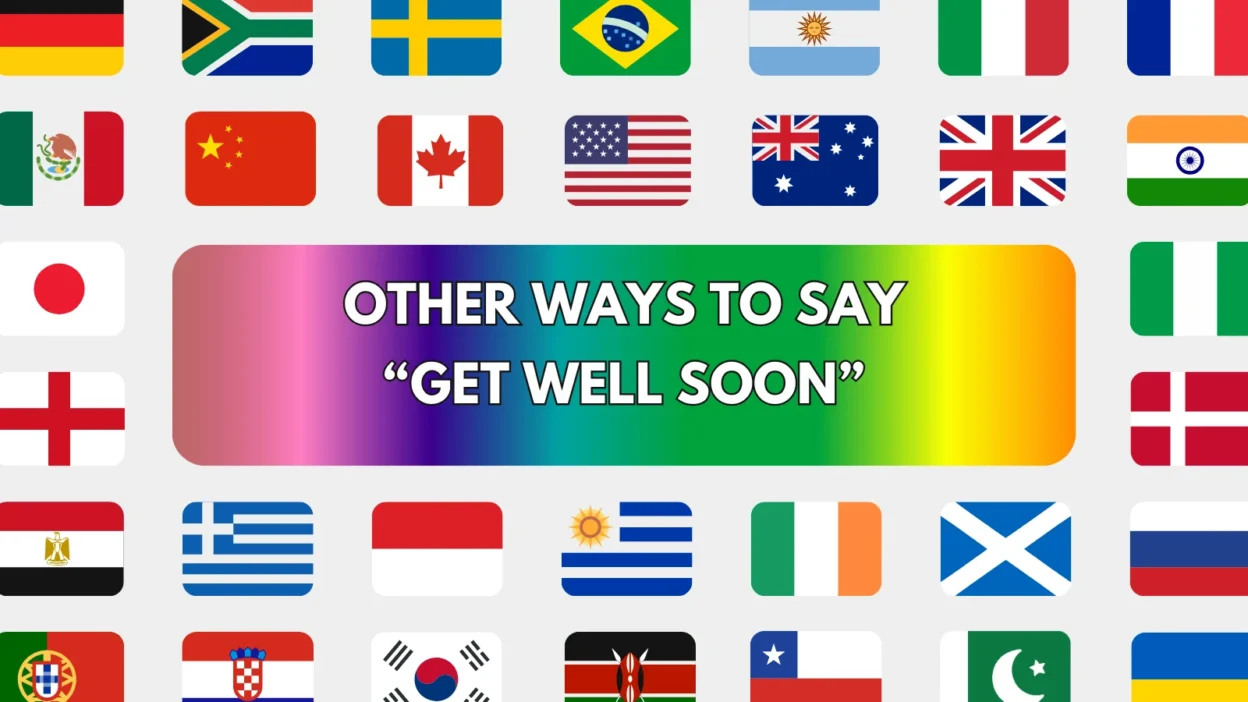The phrase “Get well soon” is a kind and common way to wish someone a speedy recovery when they’re feeling unwell. Whether it’s a simple cold, surgery, or something more serious, it’s thoughtful to show you care. However, if you’re writing a card, message, or note, repeating “get well soon” can feel generic. Using more creative or heartfelt alternatives can make your message feel more personal and sincere.
Here are 25 meaningful alternatives to say “Get well soon,” each with clear usage tips and tone to help you express care in the most fitting way.
1. Wishing you a speedy recovery
Meaning:
Expresses hope for a fast and full healing process.
Detailed Explanation:
This is one of the most direct and respectful ways to replace “get well soon.” It’s polite, caring, and versatile.
Scenario Example:
Wishing you a speedy recovery and sending lots of positive thoughts your way.
Best Use:
Cards, emails, or texts to colleagues, friends, or family.
Tone:
Warm, professional.
2. Hope you feel better soon
Meaning:
A gentle way to express care for someone who is sick or unwell.
Detailed Explanation:
This phrase is casual and kind, perfect for everyday situations.
Scenario Example:
I heard you weren’t feeling well — hope you feel better soon!
Best Use:
Casual conversations, texts.
Tone:
Friendly, informal.
3. Sending healing thoughts your way
Meaning:
Shares emotional support and positivity.
Detailed Explanation:
This is thoughtful and slightly spiritual, suitable for someone needing comfort.
Scenario Example:
Sending healing thoughts your way as you rest and recover.
Best Use:
Supportive messages, wellness cards.
Tone:
Gentle, heartfelt.
4. Take care of yourself
Meaning:
Encourages self-care and rest for recovery.
Detailed Explanation:
More of a caring reminder than a direct well-wish, but still communicates concern.
Scenario Example:
Take care of yourself and rest as much as you need.
Best Use:
Emails, supportive texts.
Tone:
Warm, reassuring.
5. Praying for your recovery
Meaning:
Offers spiritual support and well wishes.
Detailed Explanation:
Ideal for someone religious or open to spiritual comfort.
Scenario Example:
You’re in my prayers — praying for your recovery every day.
Best Use:
Spiritual or faith-based messages.
Tone:
Spiritual, sincere.
6. Hope you’re back on your feet soon
Meaning:
Wishing someone a return to health and normal activities.
Detailed Explanation:
A casual phrase great for when someone is recovering from illness or surgery.
Scenario Example:
Hope you’re back on your feet and feeling strong again soon!
Best Use:
Friendly chats, lighthearted cards.
Tone:
Casual, upbeat.
7. Rest up and take it easy
Meaning:
Encourages rest and recovery in a relaxed tone.
Detailed Explanation:
Feels like advice from a friend — comforting and light.
Scenario Example:
Don’t rush things. Rest up and take it easy!
Best Use:
Close friends, family members.
Tone:
Relaxed, caring.
8. Wishing you strength and healing
Meaning:
Hopes for emotional and physical recovery.
Detailed Explanation:
Offers more depth and emotion than a typical well-wish.
Scenario Example:
Wishing you strength and healing as you face this tough time.
Best Use:
Serious illness or recovery periods.
Tone:
Sincere, supportive.
9. Sending positive vibes
Meaning:
Communicates encouragement and energy.
Detailed Explanation:
A modern, informal way to show support.
Scenario Example:
Sending positive vibes and hope you bounce back soon!
Best Use:
Text messages, social media.
Tone:
Light, cheerful.
10. Hope each day brings you more strength
Meaning:
Wishes gradual and steady improvement.
Detailed Explanation:
Ideal for long recoveries or when healing takes time.
Scenario Example:
Thinking of you. Hope each day brings you more strength.
Best Use:
Recovery from major illness or surgery.
Tone:
Hopeful, warm.
11. Can’t wait to see you feeling better
Meaning:
Shares excitement and anticipation for their recovery.
Detailed Explanation:
Personal and optimistic — it feels encouraging.
Scenario Example:
We miss you here! Can’t wait to see you feeling better.
Best Use:
Close friends, co-workers.
Tone:
Upbeat, encouraging.
12. Take all the time you need to heal
Meaning:
Reminds the person to prioritize rest and recovery.
Detailed Explanation:
Shows patience and care, especially when healing might take a while.
Scenario Example:
Don’t worry about anything — take all the time you need to heal.
Best Use:
Workplace or family communication.
Tone:
Reassuring, gentle.
13. Hoping you bounce back quickly
Meaning:
Wishes for a fast and easy recovery.
Detailed Explanation:
Fun and playful, yet caring.
Scenario Example:
You’re tough — hoping you bounce back quickly!
Best Use:
Friends, teens, or informal settings.
Tone:
Casual, energetic.
14. Get plenty of rest
Meaning:
Encourages the person to rest for recovery.
Detailed Explanation:
More of an advice-style well-wish, but still thoughtful.
Scenario Example:
Make sure to get plenty of rest and take care.
Best Use:
Texts, wellness cards.
Tone:
Caring, gentle.
15. Heal well
Meaning:
Short and supportive phrase.
Detailed Explanation:
A quick way to express genuine concern in a meaningful way.
Scenario Example:
Thinking of you — heal well and soon.
Best Use:
Brief messages, sympathy cards.
Tone:
Simple, thoughtful.
16. Hoping for a smooth recovery
Meaning:
Wishes for an easy, complication-free healing process.
Detailed Explanation:
Sounds comforting and optimistic, especially after surgery.
Scenario Example:
Hoping for a smooth recovery and that everything goes as planned.
Best Use:
Medical or post-op messages.
Tone:
Caring, optimistic.
17. Sending you hugs and healing
Meaning:
Shares emotional warmth and comfort.
Detailed Explanation:
This phrase is personal and affectionate — best for loved ones.
Scenario Example:
Sending you hugs and healing — you’ve got this!
Best Use:
Close friends, family.
Tone:
Warm, emotional.
18. You’re in my thoughts
Meaning:
Shows you’re thinking of them during a tough time.
Detailed Explanation:
Not as direct as “get well,” but very comforting.
Scenario Example:
You’re in my thoughts — sending love and hope for your recovery.
Best Use:
Sympathetic messages, serious health situations.
Tone:
Compassionate, caring.
19. Take things one day at a time
Meaning:
Encourages patience and steady recovery.
Detailed Explanation:
Great for long-term healing or emotional recovery.
Scenario Example:
Healing takes time — take things one day at a time.
Best Use:
Recovery support, mental health encouragement.
Tone:
Gentle, wise.
20. Wishing you comfort and rest
Meaning:
Hopes the person feels at ease while healing.
Detailed Explanation:
Focuses on peace, not just physical recovery.
Scenario Example:
Wishing you comfort and rest during this time.
Best Use:
Cards, emails, messages to anyone.
Tone:
Kind, soothing.
21. Take good care of yourself
Meaning:
A reminder to prioritize self-care during recovery.
Detailed Explanation:
More nurturing than a direct “get well” phrase.
Scenario Example:
Take good care of yourself — we’re all rooting for you.
Best Use:
Family, friends, coworkers.
Tone:
Supportive, nurturing.
22. Hoping you’re back to your old self soon
Meaning:
Wishes for full health and normalcy.
Detailed Explanation:
Adds a personal touch — especially if the person is missed.
Scenario Example:
Everyone misses your energy — hoping you’re back to your old self soon!
Best Use:
Workplace or personal notes.
Tone:
Familiar, encouraging.
23. Thinking of you and wishing you well
Meaning:
Shares support and care in a soft, heartfelt way.
Detailed Explanation:
Good for expressing concern when you don’t want to sound too direct.
Scenario Example:
Just a quick note — thinking of you and wishing you well.
Best Use:
Sympathy or general recovery messages.
Tone:
Warm, sincere.
24. Wishing you brighter days ahead
Meaning:
Encourages emotional and physical recovery with hope.
Detailed Explanation:
Especially nice for people recovering from emotional strain or chronic illness.
Scenario Example:
Wishing you brighter days ahead and lots of healing energy.
Best Use:
Cards, support messages.
Tone:
Hopeful, optimistic.
25. All my best as you recover
Meaning:
A formal but kind way to express well-wishes.
Detailed Explanation:
Suitable for professional or respectful relationships.
Scenario Example:
All my best as you recover — looking forward to your return.
Best Use:
Professional or respectful messages.
Tone:
Polite, formal.
Conclusion
While “Get well soon” is always appreciated, using thoughtful alternatives like “Wishing you strength and healing” or “Take good care of yourself” can make your message feel more personal, compassionate, and sincere. Whether you’re sending a card, a text, or an email, choosing the right phrase helps you express care in a way that truly connects.

Hadi Bhatti is a passionate writer and content creator at Saypadia, known for turning complex words, phrases, and internet slang into simple, easy-to-understand explanations. With a strong interest in language, meanings, and digital communication, Hadi focuses on helping readers understand what words really mean in everyday use. His writing style is clear, engaging, and user-focused, making learning both practical and enjoyable.




